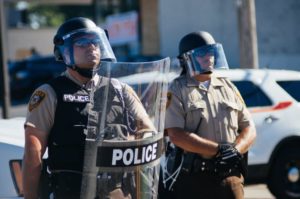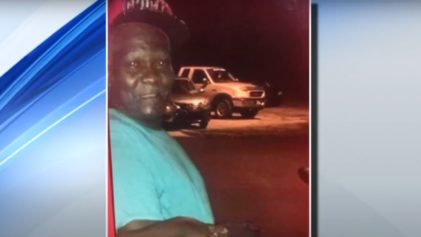
Source: Wikimedia Commons
The Trump White House is a law and order administration making good on its promises to get tough on crime, increase the police presence in the community and focus on the priorities of law enforcement. Blue lives matter in Trump’s America, a reality that was reinforced in U.S. Attorney General Jeff Sessions’ decision to review the Department of Justice consent decrees with police departments across the country. The decision to take another look at these decrees — agreements to reform troubled police departments with a history of brutality, violence and racially discriminatory practices — would seem to fall in line with the interests of the Fraternal Order of Police. The F.O.P. endorsed Trump and supported Sessions in his nomination for attorney general, believing both would put police officers first. In segments of the Black community, Sessions’ announcement raises red flags, with Black activists and police officers in Ferguson warning that this is a push to end or alter these agreements and move away from the direction of reform.
In a DOJ memorandum dated March 31 titled, “Supporting Federal, State, Local and Tribal Law Enforcement,” Sessions said that local police must protect and respect civil rights, but it is not the responsibility of the federal government to manage nonfederal law enforcement agencies. He ordered his staff to undergo a sweeping review of department activities to determine if they fall in line with the principles of the Trump administration. “The federal government alone cannot successfully address rising crimes rates, secure public safety, protect and respect the civil rights of all members of the public or implement best practices in policing. These are, first and foremost, tasks for state, local, and tribal law enforcement,” he wrote.
In his confirmation hearing in January, Sessions had laid the groundwork by expressing his reservations with federal involvement in local policing. “I think there is concern that good police officers and good departments can be sued by the Department of Justice when you just have individuals within a department that have done wrong,” Sessions said in his confirmation hearing in January, as reported by The Baltimore Sun. “These lawsuits undermine the respect for police officers and create an impression that the entire department is not doing their work consistent with fidelity to law and fairness, and we need to be careful before we do that.”

Jeff Sessions (Source: Wikimedia Commons)
Hanging in the balance are the efforts the Obama administration made with nearly two dozen cities to reform their police departments, as The New York Times reported, leading to DOJ consent decrees with 14 cities such as Ferguson, Cleveland, Seattle and Baltimore. The proposed Baltimore agreement appears in jeopardy as the DOJ now has “grave concerns” it does not promote public safety, according to The Baltimore Sun.
“It really is our belief that these consent decrees are in place for a reason. It’s actually kind of scary that Jeff Sessions is going in as attorney general and reviewing the policies in place,” said Heather Taylor, president of the Ethical Society of Police (E.S.O.P. Genesis), an association of Black police officers in the St. Louis metropolitan area.
“This is not about individual officers. These are paid professionals that look into policies and procedures from top to bottom and come to the conclusion that the Department of Justice had to come in and intervene,” Taylor noted. “It is really scary for our community. From our standpoint, we don’t see the decision to do that as a good one. It will probably embolden some police officers.” She added that consent decrees are designed to bring the community together to change policies and stop implicit bias.
According to Taylor, while the DOJ has the power to review police departments, that is now out the window under the current administration. “We’re really in trouble. In the conversations after the death of Mike Brown, we were able to shine the light on departments that have bad practices. Not everyone in those departments were absolutely bad,” she said, also noting problems that were uncovered such as racial profiling, disparities in police checks, corruption, promotion of Black officers and internal affairs divisions turning a blind eye to bad officers.
In St. Louis, Black pedestrians are pulled over at a much higher rate than whites, Taylor said, although they have a much lower probability of possessing drugs. Taylor also said her association has teamed up with the ACLU of Missouri to address racial disparities and seek changes to the state’s racial profiling laws, which have not been updated in 17 years.
“With the F.O.P. endorsing Trump, with things said concerning protected groups, police are disconnected from the community. Police community relations are at an all-time low,” Taylor said. The Fraternal Order of Police issued a wish list for the first 100 days of the Trump administration, which included such measures as elimination of Obama-era policing reforms and recommendations, reversal of the federal ban on private prisons, removal of the Bush-era prohibition on racial profiling by federal agencies, restricting aid to sanctuary cities and repealing and replacing Obamacare.
James O. Pasco. executive director of the National Fraternal Order of Police, said his organization is not against investigations into law enforcement. “Contrary to urban legend, the F.O.P. does not oppose investigation of police departments. But, we hold that the investigations of police departments should have probable cause and shouldn’t be fishing expeditions,” Pasco said. “No one [dis]likes a bad cop more than the police officers that have to work with that police officer, so we want to root it out more than anyone.”
The F.O.P. leader also said that bad officers cannot thrive in a well-managed police department, and it is necessary to look at poor hiring, training, management and supervision. “Those things can be solved by hiring better chiefs, maybe by hiring better mayors,” he added.
Pasco also noted that it is the responsibility of the F.O.P. to point out any deficiencies in an agreement involving its members. “We don’t oppose an investigation when an investigation is warranted, whether a consent decree or collaborative agreement, it should be designed to improve the relationship between the city and the community and result in a safer and more harmonious community. In many instances, that has not been the case.”
On the other hand, Black police officers have a different relationship with the Black community and are uniquely situated to speak to the problems facing police-community relations. “We are from those communities, those ghettos, those schools, those environments where people don’t have those opportunities. It is a different perspective,” Taylor of E.S.O.P. Genesis said. “We can understand people having a criminal history and not being a criminal. It’s just a different perspective.”
E.S.O.P. Genesis was founded in 1972 by a group of African-American police officers that faced racism within the St. Louis Metropolitan Police Department. The organization serves as a bridge between the community and the police and its existence underscores the ongoing racism that faces the Black community and Black law enforcement, whether in the St. Louis and Ferguson area or throughout the nation.
“There’s a need for a separate association because of the history of our country and race relations. Our people were slaves. There is a segment of police and the population that does not respect us as people. There’s a need for us to have separate organization. It is a no-brainer. Just because we are wearing blue does not mean we are part of that blue code,” Taylor said. “We do this job because we are proud of our community, proud of our history. We see how things are on the inside. We are Black first and we are focused on our community.”
What is the future of police-community relations and police reform itself, in Ferguson and beyond, under this new federal landscape? Organizations such as the Ethical Society of Police, Taylor offered, understand that police must connect with the community or they are not going to make any headway.
“The problem is many departments don’t want connections with the community. They don’t care, they care about enforcement,” she said. “If people don’t trust you, they aren’t going to call you about crimes and leave anonymous tips. If you don’t have people who look like people in the community, they’re not going to talk to you.
“If you don’t have people who look like the people you’re investigating, there’s a problem.”


